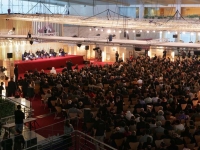Politics
More than 200 global experts will dialogue about violence and extremism
Organized by the Club de Madrid
USPA NEWS -
The Policy Dialogue Madrid+10 on Preventing and Countering Violent Extremism will be inaugurated by the King of Spain, Philip VI, Tuesday. The King will be accompanied in the inaugural session, among others, by the President of the Club de Madrid and former President of Latvia, Vaira Vike-Freiberga.
Also the Mayor of Madrid, Manuela Carmena, and the Minister of Interior of Spain, Jorge Fernandez Diaz. The Policy Dialogue will be organized by the Club de Madrid and the International Centre for the Study of Radicalisation and Political Violence (ICSR) at King´s College London with the European Commission, the International Dialogue Centre (KAICIID), the US State Department and the Spanish Ministry of Foreign Affairs as main partners. Forty Club de Madrid Members, all of them former prime ministers and presidents democratically elected from all over the world, along with 200 of the most influential high level experts in the fight against radicalism will be listening to the King´s speech.
The policy dialogue be closed with the Secretary General of the United Nations, Ban Ki-moon, as the keynote speaker. The other panelists on this session will be Jose Garcia-Margallo, Spanish Minister of Foreign Affairs; Vaira Vike-Freiberga, President of the Club de Madrid; Danilo Turk, Member of the Club de Madrid and former President of Slovenia, and Lord John Alderdice, former speaker of the Northern Ireland Assembly.
Madrid+10 Policy Dialogue brings together political leaders, policy makers and grassroots initiatives in the search for smart and long term solutions to prevent and counter violent extremism. The discussions will be enriched, among many others, with contributions from the Prime Minister of Tunisa Habbid Essid and 40 former world leaders and Club de Madrid Members, like Kjell Magne Bondevik (Norway); John Bruton (Ireland); Wim Kok (The Netherlands); Yves Letterme (Belgium); Iveta Radicova (Slovaquia) and Danilo Turk (Slovenia).
Also Jose Luis Rodríguez Zapatero, former Prime Minister of Spain; Fuad Siniora (Lebanon); Sadiq Al Mahdi (Sudan); Mehdi Jomaa and Mehdi Jebali (Tunisia); Olusegun Obasanjo (Nigeria); Cassam Uteem (Mauritius); Felipe Calderon (Mexico); Laura Chinchilla (Costa Rica); Ricardo Lagos y Sebastian Piñera (Chile); Jorge Tuto Quiroga (Bolivia); Andres Pastrana (Colombia); Roza Otunbayeva (Kyrgystan); Jose Manuel Ramos-Horta (Timor Leste); Jigme Yoser Thinley (Buthan) Jennifer Mary Shipley (New Zealand).
Among our partners and participants there will also be prominent names in preventing and countering violent extremism from different sectors, such as Fernando Frutuoso de Melo, Directorate General for International Cooperation and Development of the European Commision; Faisal Bin Abdulrahman Bin Muaammar, Secretary-General of KAICIID; Sarah Sewall, Under Secretary for Civilian Security, Democracy, and Human Rights, U.S. State Department; Hanif Qadir, Founder of the Active Change Foundation and former extremist, discussing New Approaches towards Preventing Violent Extremism and Jean Paul Laborde, UN Assistant Secretary-General and Executive Director, Counter-Terrorism Committee Executive Directorate (CTED).
All of these high level experts and policy makers will work on what will be the main outcome of this Policy Dialogue, a document titled #GlobalConsensus, a statement spelling out the common values, assumptions, and principles that stand the best chance of achieving real, sustainable progress in the struggle against violent extremism. Following its presentation at the conference, the #GlobalConsensus will be available in the Madrid+10 online platform where different interlocutors and partners can read and sign on to it, sustaining the commitment and engaging in a debate on how its principles can be translated into policies, strategies and measures.
Liability for this article lies with the author, who also holds the copyright. Editorial content from USPA may be quoted on other websites as long as the quote comprises no more than 5% of the entire text, is marked as such and the source is named (via hyperlink).






